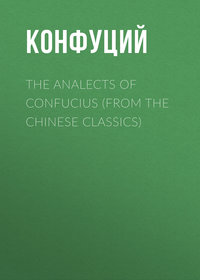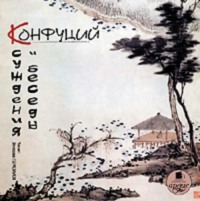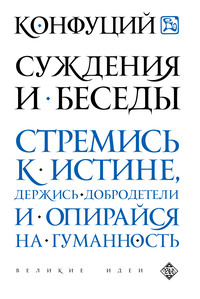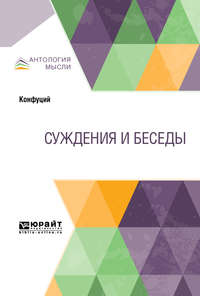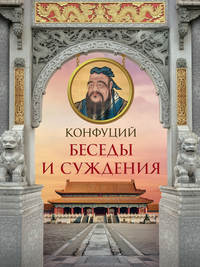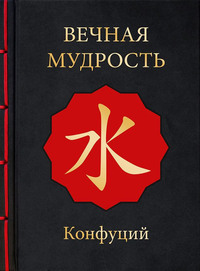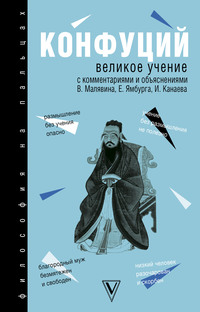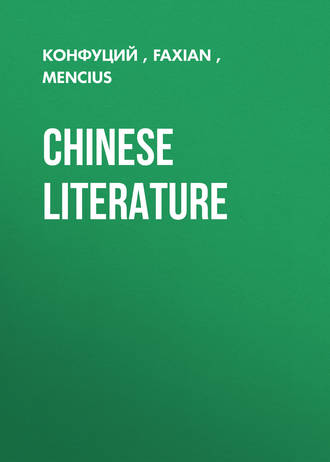 полная версия
полная версияChinese Literature
"Why should he really do so?" answered the Master. "The good man or, a superior man might be induced to go, but not to go down. He may be misled, but not befooled."
"The superior man," said he, "with his wide study of books, and hedging himself round by the Rules of Propriety, is not surely, after all that, capable of overstepping his bounds."
Once when the Master had had an interview with Nan-tsz, which had scandalized his disciple Tsz-lu, he uttered the solemn adjuration, "If I have done aught amiss, may Heaven reject me! may Heaven reject me!"
"How far-reaching," said he, "is the moral excellence that flows from the Constant Mean!15 It has for a long time been rare among the people."
Tsz-kung said, "Suppose the case of one who confers benefits far and wide upon the people, and who can, in so doing, make his bounty universally felt—how would you speak of him? Might he be called philanthropic?"
The Master exclaimed, "What a work for philanthropy! He would require indeed to be a sage! He would put into shade even Yau and Shun!—Well, a philanthropic person, desiring for himself a firm footing, is led on to give one to others; desiring for himself an enlightened perception of things, he is led on to help others to be similarly enlightened. If one could take an illustration coming closer home to us than yours, that might be made the starting-point for speaking about philanthropy."
BOOK VII
Characteristics of Confucius—An Incident
Said the Master:—
"I, as a transmitter16 and not an originator, and as one who believes in and loves the ancients, venture to compare myself with our old P'ang.
"What find you indeed in me?—a quiet brooder and memorizer; a student never satiated with learning; an unwearied monitor of others!
"The things which weigh heavily upon my mind are these—failure to improve in the virtues, failure in discussion of what is learnt, inability to walk according to knowledge received as to what is right and just, inability also to reform what has been amiss."
In his hours of recreation and refreshment the Master's manner was easy and unconstrained, affable and winning.
Once he exclaimed, "Alas! I must be getting very feeble; 'tis long since I have had a repetition of the dreams in which I used to see the Duke of Chow.17
"Concentrate the mind," said he, "upon the Good Way.
"Maintain firm hold upon Virtue.
"Rely upon Philanthropy.
"Find recreation in the Arts.18
"I have never withheld instruction from any, even from those who have come for it with the smallest offering.
"No subject do I broach, however, to those who have no eager desire to learn; no encouraging hint do I give to those who show no anxiety to speak out their ideas; nor have I anything more to say to those who, after I have made clear one corner of the subject, cannot from that give me the other three."
If the Master was taking a meal, and there were any in mourning beside him, he would not eat to the full.
On one day on which he had wept, on that day he would not sing.
Addressing his favorite disciple, he said, "To you only and myself it has been given to do this—to go when called to serve, and to go back into quiet retirement when released from office."
Tsz-lu, hearing the remark said, "But if, sir, you had the handling of the army of one of the greater States,19 whom would you have associated with you in that case?"
The Master answered:—
"Not the one 'who'll rouse the tiger,' Not the one 'who'll wade the Ho;'not the man who can die with no regret. He must be one who should watch over affairs with apprehensive caution, a man fond of strategy, and of perfect skill and effectiveness in it."
As to wealth, he remarked, "If wealth were an object that I could go in quest of, I should do so even if I had to take a whip and do grooms' work. But seeing that it is not, I go after those objects for which I have a liking."
Among matters over which he exercised great caution were times of fasting, war, and sickness.
When he was in the State of Ts'i, and had heard the ancient Shau music, he lost all perception of the taste of his meat. "I had no idea," said he, "that music could have been brought to this pitch."
In the course of conversation Yen Yu said, "Does the Master take the part of the Prince of Wei?" "Ah yes!" said Tsz-kung, "I will go and ask him that."
On going in to him, that disciple began, "What sort of men were Peh-I and Shuh Ts'i?" "Worthies of the olden time," the Master replied. "Had they any feelings of resentment?" was the next question. "Their aim and object," he answered, "was that of doing the duty which every man owes to his fellows, and they succeeded in doing it;—what room further for feelings of resentment?" The questioner on coming out said, "The Master does not take his part."
"With a meal of coarse rice," said the Master, "and with water to drink, and my bent arm for my pillow—even thus I can find happiness. Riches and honors without righteousness are to me as fleeting clouds."
"Give me several years more to live," said he, "and after fifty years' study of the 'Book of Changes' I might come to be free from serious error."
The Master's regular subjects of discourse were the "Books of the Odes" and "History," and the up-keeping of the Rules of Propriety. On all of these he regularly discoursed.
The Duke of Shih questioned Tsz-lu about Confucius, and the latter did not answer.
Hearing of this, the Master said, "Why did you not say, He is a man with a mind so intent on his pursuits that he forgets his food, and finds such pleasure in them that he forgets his troubles, and does not know that old age is coming upon him?"
"As I came not into life with any knowledge of it," he said, "and as my likings are for what is old, I busy myself in seeking knowledge there."
Strange occurrences, exploits of strength, deeds of lawlessness, references to spiritual beings—such-like matters the Master avoided in conversation.
"Let there," he said, "be three men walking togetherfrom that number I should be sure to find my instructors; for what is good in them I should choose out and follow, and what is not good I should modify."
On one occasion he exclaimed, "Heaven begat Virtue in me; what can man do unto me?"
To his disciples he once said, "Do you look upon me, my sons, as keeping anything secret from you? I hide nothing from you. I do nothing that is not manifest to your eyes, my disciples. That is so with me."
Four things there were which he kept in view in his teaching—scholarliness, conduct of life, honesty, faithfulness.
"It is not given to me," he said, "to meet with a sage; let me but behold a man of superior mind, and that will suffice. Neither is it given to me to meet with a good man; let me but see a man of constancy, and it will suffice. It is difficult for persons to have constancy, when they pretend to have that which they are destitute of, to be full when they are empty, to do things on a grand scale when their means are contracted!"
When the Master fished with hook and line, he did not also use a net.
When out with his bow, he would never shoot at game in cover.
"Some there may be," said he, "who do things in ignorance of what they do. I am not of these. There is an alternative way of knowing things, viz.—to sift out the good from the many things one hears, and follow it; and to keep in memory the many things one sees."
Pupils from Hu-hiang were difficult to speak with. One youth came to interview the Master, and the disciples were in doubt whether he ought to have been seen. "Why so much ado," said the Master, "at my merely permitting his approach, and not rather at my allowing him to draw back? If a man have cleansed himself in order to come and see me, I receive him as such; but I do not undertake for what he will do when he goes away."
"Is the philanthropic spirit far to seek, indeed?" the Master exclaimed;
"I wish for it, and it is with me!"
The Minister of Crime in the State of Ch'in asked Confucius whether Duke Ch'an, of Lu was acquainted with the Proprieties; and he answered, "Yes, he knows them."
When Confucius had withdrawn, the minister bowed to Wu-ma K'i, a disciple, and motioned to him to come forward. He said, "I have heard that superior men show no partiality; are they, too, then, partial? That prince took for his wife a lady of the Wu family, having the same surname as himself, and had her named 'Lady Tsz of Wu, the elder,' If he knows the Proprieties, then who does not?"
The disciple reported this to the Master, who thereupon remarked, "Well for me! If I err in any way, others are sure to know of it."
When the Master was in company with any one who sang, and who sang well, he must needs have the song over again, and after that would join in it.
"Although in letters," he said, "I may have none to compare with me, yet in my personification of the 'superior man' I have not as yet been successful."
"'A Sage and a Philanthropist?' How should I have the ambition?" said he. "All that I can well be called is this—An insatiable student, an unwearied teacher;—this, and no more."—"Exactly what we, your disciples, cannot by any learning manage to be," said Kung-si Hwa.
Once when the Master was seriously ill, Tsz-lu requested to be allowed to say prayers for him. "Are such available?" asked the Master. "Yes," said he; "and the Manual of Prayers says, 'Pray to the spirits above and to those here below,'"
"My praying has been going on a long while," said the Master.
"Lavish living," he said, "renders men disorderly; miserliness makes them hard. Better, however, the hard than the disorderly."
Again, "The man of superior mind is placidly composed; the small-minded man is in a constant state of perturbation."
The Master was gentle, yet could be severe; had an over-awing presence, yet was not violent; was deferential, yet easy.
BOOK VIII
Sayings of Tsang—Sentences of the Master
Speaking of T'ai-pih the Master said that he might be pronounced a man of the highest moral excellence; for he allowed the empire to pass by him onwards to a third heir; while the people, in their ignorance of his motives, were unable to admire him for so doing.
"Without the Proprieties," said the Master, "we have these resultsfor deferential demeanor, a worried one; for calm attentiveness, awkward bashfulness; for manly conduct, disorderliness; for straightforwardness, perversity.
"When men of rank show genuine care for those nearest to them in blood, the people rise to the duty of neighborliness and sociability. And when old friendships among them are not allowed to fall off, there will be a cessation of underhand practices among the people."
The Scholar Tsang was once unwell, and calling his pupils to him he said to them, "Disclose to view my feet and my hands. What says the Ode?—
'Act as from a sense of danger, With precaution and with care, As a yawning gulf o'erlooking, As on ice that scarce will bear,'At all times, my children, I know how to keep myself free from bodily harm."
Again, during an illness of his, Mang King, an official, went to ask after him. The Scholar had some conversation with him, in the course of which he said—
"'Doleful the cries of a dying bird, Good the last words of a dying man,'There are three points which a man of rank in the management of his duties should set store upon:—A lively manner and deportment, banishing both severity and laxity; a frank and open expression of countenance, allied closely with sincerity; and a tone in his utterances utterly free from any approach to vulgarity and impropriety. As to matters of bowls and dishes, leave such things to those who are charged with the care of them."
Another saying of the Scholar Tsang"I once had a friend who, though he possessed ability, would go questioning men of none, and, though surrounded by numbers, would go with his questions to isolated individuals; who also, whatever he might have, appeared as if he were without it, and, with all his substantial acquirements, made as though his mind were a mere blank; and when insulted would not retaliate;—this was ever his way."
Again he said"The man that is capable of being intrusted with the charge of a minor on the throne, and given authority over a large territory, and who, during the important term of his superintendence cannot be forced out of his position, is not such a 'superior man'? That he is, indeed."
Again:—"The learned official must not be without breadth and power of endurancethe burden is heavy, and the way is long.
"Suppose that he take his duty to his fellow-men as his peculiar burden, is that not indeed a heavy one? And since only with death it is done with, is not the way long?"
Sentences of the Master:—
"From the 'Book of Odes' we receive impulses; from the 'Book of the Rules,' stability; from the 'Book on Music,' refinement.20
"The people may be put into the way they should go, though they may not be put into the way of understanding it.
"The man who likes bravery, and yet groans under poverty, has mischief in him. So, too, has the misanthrope, groaning at any severity shown towards him.
"Even if a person were adorned with the gifts of the Duke of Chow, yet if he were proud and avaricious, all the rest of his qualities would not indeed be worth looking at.
"Not easily found is the man who, after three years' study, has failed to come upon some fruit of his toil.
"The really faithful lover of learning holds fast to the Good Way till death.
"He will not go into a State in which a downfall is imminent, nor take up his abode in one where disorder reigns. When the empire is well ordered he will show himself; when not, he will hide himself away. Under a good government it will be a disgrace to him if he remain in poverty and low estate; under a bad one, it would be equally disgraceful to him to hold riches and honors.
"If not occupying the office, devise not the policy.
"When the professor Chi began his duties, how grand the finale of the First of the Odes used to be! How it rang in one's ears!
"I cannot understand persons who are enthusiastic and yet not straightforward; nor those who are ignorant and yet not attentive; nor again those folks who are simple-minded and yet untrue.
"Learn, as if never overtaking your object, and yet as if apprehensive of losing it.
"How sublime was the handling of the empire by Shun and Yu!—it was as nothing to them!
"How great was Yau as a prince! Was he not sublime! Say that Heaven only is great, then was Yau alone after its pattern! How profound was he! The people could not find a name for him. How sublime in his achievements! How brilliant in his scholarly productions!"
Shun had for his ministers five men, by whom he ordered the empire.
King Wu (in his day) stated that he had ten men as assistants for the promotion of order.
With reference to these facts Confucius observed, "Ability is hard to find. Is it not so indeed? During the three years' interregnum between Yau and Shun there was more of it than in the interval before this present dynasty appeared. There were, at this latter period, one woman, and nine men only.
"When two-thirds of the empire were held by King Wan, he served with that portion the House of Yin. We speak of the virtue of the House of Chow; we may say, indeed, that it reached the pinnacle of excellence."
"As to Yu," added the Master, "I can find no flaw in him. Living on meagre food and drink; yet providing to the utmost in his filial offerings to the spirits of the dead! Dressing in coarse garments; yet most elegant when vested in his sacrificial apron and coronet! Dwelling in a poor palace; yet exhausting his energies over those boundary-ditches and watercourses! I can find no flaw in Yu."
BOOK IX
His Favorite Disciple's Opinion of Him
Topics on which the Master rarely spoke were—Advantage, and Destiny, and Duty of man to man.
A man of the village of Tah-hiang exclaimed of him, "A great man is Confucius!—a man of extensive learning, and yet in nothing has he quite made himself a name!"
The Master heard of this, and mentioning it to his disciples he said, "What then shall I take in hand? Shall I become a carriage driver, or an archer? Let me be a driver!"
"The sacrificial cap," he once said, "should, according to the Rules, be of linen; but in these days it is of pure silk. However, as it is economical, I do as all do.
"The Rule says, 'Make your bow when at the lower end of the hall'; but nowadays the bowing is done at the upper part. This is great freedom; and I, though I go in opposition to the crowd, bow when at the lower end."
The Master barred four words:—he would have no "shall's," no "must's," no "certainty's," no "I's."
Once, in the town of K'wang fearing that his life was going to be taken, the Master exclaimed, "King Wan is dead and gone; but is not 'wan'21 with you here? If Heaven be about to allow this 'wan' to perish, then they who survive its decease will get no benefit from it. But so long as Heaven does not allow it to perish, what can the men of K'wang do to me?"
A high State official, after questioning Tsz-kung, said, "Your Master is a sage, then? How many and what varied abilities must be his!"
The disciple replied, "Certainly Heaven is allowing him full opportunities of becoming a sage, in addition to the fact that his abilities are many and varied."
When the Master heard of this he remarked, "Does that high official know me? In my early years my position in life was low, and hence my ability in many ways, though exercised in trifling matters. In the gentleman is there indeed such variety of ability? No."
From this, the disciple Lau used to say, "'Twas a saying of the Master'At a time when I was not called upon to use them, I acquired my proficiency in the polite arts.'"
"Am I, indeed," said the Master, "possessed of knowledge? I know nothing. Let a vulgar fellow come to me with a question—a man with an emptyish head—I may thrash out with him the matter from end to end, and exhaust myself in doing it!"
"Ah!" exclaimed he once, "the phoenix does not come! and no symbols issue from the river! May I not as well give up?"
Whenever the Master met with a person in mourning, or with one in full-dress cap and kirtle, or with a blind person, although they might be young persons, he would make a point of rising on their appearance, or, if crossing their path, would do so with quickened step!
Once Yen Yuen exclaimed with a sigh (with reference to the Master's doctrines), "If I look up to them, they are ever the higher; if I try to penetrate them, they are ever the harder; if I gaze at them as if before my eyes, lo, they are behind me!—Gradually and gently the Master with skill lures men on. By literary lore he gave me breadth; by the Rules of Propriety he narrowed me down. When I desire a respite, I find it impossible; and after I have exhausted my powers, there seems to be something standing straight up in front of me, and though I have the mind to make towards it I make no advance at all."
Once when the Master was seriously ill, Tsz-lu induced the other disciples to feign they were high officials acting in his service. During a respite from his malady the Master exclaimed, "Ah! how long has Tsz-lu's conduct been false? Whom should I delude, if I were to pretend to have officials under me, having none? Should I deceive Heaven? Besides, were I to die, I would rather die in the hands of yourselves, my disciples, than in the hands of officials. And though I should fail to have a grand funeral over me, I should hardly be left on my death on the public highway, should I?"
Tsz-kung once said to him, "Here is a fine gem. Would you guard it carefully in a casket and store it away, or seek a good price for it and sell it?" "Sell it, indeed," said the Master—"that would I; but I should wait for the bidder."
The Master protested he would "go and live among the nine wild tribes."
"A rude life," said some one;—"how could you put up with it?"
"What rudeness would there be," he replied, "if a 'superior man' was living in their midst?"
Once he remarked, "After I came back from Wei to Lu the music was put right, and each of the Festal Odes and Hymns was given its appropriate place and use."
"Ah! which one of these following," he asked on one occasion, "are to be found exemplified in me—proper service rendered to superiors when abroad; duty to father and elder brother when at home; duty that shrinks from no exertion when dear ones die; and keeping free from the confusing effects of wine?"
Standing once on the bank of a mountain stream, he said (musingly),
"Like this are those that pass away—no cessation, day or night!"
Other sayings:—
"Take an illustration from the making of a hill. A simple basketful is wanting to complete it, and the work stops. So I stop short.
"Take an illustration from the levelling of the ground. Suppose again just one basketful is left, when the work has so progressed. There I desist!
"Ah! it was Hwúi, was it not? who, when I had given him his lesson, was the unflagging one!
"Alas for Hwúi! I saw him ever making progress. I never saw him stopping short.
"Blade, but no bloom—or else bloom, but no produce; aye, that is the way with some!
"Reverent regard is due to youth. How know we what difference there may be in them in the future from what they are now? Yet when they have reached the age of forty or fifty, and are still unknown in the world, then indeed they are no more worthy of such regard.
"Can any do otherwise than assent to words said to them by way of correction? Only let them reform by such advice, and it will then be reckoned valuable. Can any be other than pleased with words of gentle suasion? Only let them comply with them fully, and such also will be accounted valuable. With those who are pleased without so complying, and those who assent but do not reform, I can do nothing at all.
"Give prominent place to loyalty and sincerity.
"Have no associates in study who are not advanced somewhat like yourself.
"When you have erred, be not afraid to correct yourself.
"It may be possible to seize and carry off the chief commander of a large army, but not possible so to rob one poor fellow of his will.
"One who stands—clad in hempen robe, the worse for wear—among others clad in furs of fox and badger, and yet unabashed—'tis Tsz-lu, that, is it not?"
Tsz-lu used always to be humming over the lines—
"From envy and enmity free, What deed doth he other than good?""How should such a rule of life," asked the Master, "be sufficient to make any one good?"
"When the year grows chilly, we know the pine and cypress are the last to fade.
"The wise escape doubt; the good-hearted, trouble; the bold, apprehension.
"Some may study side by side, and yet be asunder when they come to the logic of things. Some may go on together in this latter course, but be wide apart in the standards they reach in it. Some, again, may together reach the same standard, and yet be diverse in weight of character."
"The blossom is out on the cherry tree, With a flutter on every spray. Dost think that my thoughts go not out to thee? Ah, why art thou far away!"Commenting on these lines the Master said, "There can hardly have been much 'thought going out,' What does distance signify?"
BOOK X
Confucius in Private and Official Life
In his own village, Confucius presented a somewhat plain and simple appearance, and looked unlike a man who possessed ability of speech.
But in the ancestral temple, and at Court, he spoke with the fluency and accuracy of a debater, but ever guardedly.
At Court, conversing with the lower order of great officials, he spoke somewhat firmly and directly; with those of the higher order his tone was somewhat more affable.
When the prince was present he was constrainedly reverent in his movements, and showed a proper degree of grave dignity in demeanor.
Whenever the prince summoned him to act as usher to the Court, his look would change somewhat, and he would make as though he were turning round to do obeisance.


